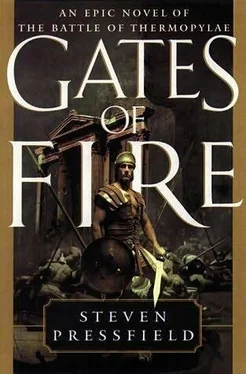Steven Pressfield - Gates of Fire - An Epic Novel of the Battle of Thermopylae
Здесь есть возможность читать онлайн «Steven Pressfield - Gates of Fire - An Epic Novel of the Battle of Thermopylae» весь текст электронной книги совершенно бесплатно (целиком полную версию без сокращений). В некоторых случаях можно слушать аудио, скачать через торрент в формате fb2 и присутствует краткое содержание. Жанр: Историческая проза, на английском языке. Описание произведения, (предисловие) а так же отзывы посетителей доступны на портале библиотеки ЛибКат.
- Название:Gates of Fire: An Epic Novel of the Battle of Thermopylae
- Автор:
- Жанр:
- Год:неизвестен
- ISBN:нет данных
- Рейтинг книги:3 / 5. Голосов: 1
-
Избранное:Добавить в избранное
- Отзывы:
-
Ваша оценка:
- 60
- 1
- 2
- 3
- 4
- 5
Gates of Fire: An Epic Novel of the Battle of Thermopylae: краткое содержание, описание и аннотация
Предлагаем к чтению аннотацию, описание, краткое содержание или предисловие (зависит от того, что написал сам автор книги «Gates of Fire: An Epic Novel of the Battle of Thermopylae»). Если вы не нашли необходимую информацию о книге — напишите в комментариях, мы постараемся отыскать её.
Gates of Fire: An Epic Novel of the Battle of Thermopylae — читать онлайн бесплатно полную книгу (весь текст) целиком
Ниже представлен текст книги, разбитый по страницам. Система сохранения места последней прочитанной страницы, позволяет с удобством читать онлайн бесплатно книгу «Gates of Fire: An Epic Novel of the Battle of Thermopylae», без необходимости каждый раз заново искать на чём Вы остановились. Поставьте закладку, и сможете в любой момент перейти на страницу, на которой закончили чтение.
Интервал:
Закладка:
Always in rhe hills Dio and I had slept in each other's arms, not as lovers, but for warmth. These final nights on the road, she wrapped herself in her own cloak and took her sleep apart. At last we arrived at dawn before the Three Corners. I had stopped and was watching a freight waggon pass. I could feel my cousin's eyes upon me.
You're not coming, are you?
I said nothing.
She knew which fork I would be taking.
Bruxieus will be angry with you, she said.
Dio and I had learned, from the dogs and on the hunt, how to communicate with just a look. I told her good-bye with my eyes and begged her to understand, She would be well cared for in this city. Her life as a woman was just beginning.
The Spartans will be cruel to you, Diomache said. The dogs paced impatiently at our feet. They did not yet know that they were parting too. Dio took my hands in both of hers. And will we never sleep in each other's arms again, cousin?
It must have seemed a queer spectacle to the teamsters and farm boys passing, the sight of these two wild children embracing upon the roadside, with their slung bows and dag' gers and their cloaks bound into traveler's rolls upon their backs.
Diomache took her road and I took mine. She was fifteen. I was twelve.
How much of this I imparted to Alexandros in those hours in the water, I cannot say. Dawn had still not shown her face when I finished. We were clinging to a miserable floating spar, barely big enough to support one, and too exhausted to swim another stroke. The water was getting colder. Hypothermia gripped our limbs; I heard Alexandros cough and sputter, struggling for the strength to speak.
We have to quit this spar. If we don't, we'll die.
My eyes strained toward the north. Peaks could be made out, but the shore itself remained invisible. Alexandras' cold hand clasped mine.
Whatever happens, he swore, I will not abandon you.
He let go of the spar. I followed.
An hour later we collapsed like Odysseus on a rock beach beneath a bawling rookery. We gulped fresh water from a cliff-wall spring, washed the salt from our hair and eyes and knelt in thanksgiving for our deliverance. For half the morning we slept like the dead. I climbed for eggs, which we wolfed raw from the shell, standing on the sand in the rags of our garments.
Thank you, my friend, Alexandros said very quietly.
He extended his hand; I took it.
Thank you too.
The sun stood near its zenith; our salt-stiff cloaks had dried upon our backs.
Let's get moving, Alexandros said. We've lost half a day.
Chapter Eleven
The battle took place on a dusty plain to the west of the I city of Antirhion, within bowshot of the beach and immediately beneath the citadel walls. A desultory stream, the Akanathus, meandered across the plain, bisecting it at the midpoint. Perpendicular to this watercourse, along the seaward flank, the Antirhionians had thrown up a crude battle wall. Rugged hills sealed the enemy's left. A portion of the plain adjacent the wall was occupied by a maritime junkyard; rotting craft lay littered at all angles, extending halfway across the field, amid tumbledown work shacks and stinking mounds of debris squalled over by wheeling flocks of gulls. In addition the enemy had strewn boulders and driftwood to break up the flat over which Leonidas and his men must advance. Their own side, the foe's, had been cleared smooth as a schoolmaster's desk.
When Alexandros and I scurried breathless and tardy upon the site, the Spartan Skiritai rangers had just finished setting the enemy refuse yards ablaze. The armies yet stood in formation, twofifths of a mile apart, with the burning hulks between them. All native merchantmen and fishing craft had been withdrawn by the enemy, either hauled to safety within the fortified portion of the anchorage or standing offshore beyond the invaders' reach. This did not deter the Skiritai from torching the wharves and warehouses of the harbor.
The timbers of the ship sheds the rangers had saturated with naphtha; already they blazed in ruins to the waterline. The defenders of Antirhion, as Leonidas and the Spartans well knew, were militiamen, farmers and potters and fishermen, summertime soldiers like my father. The devastation of their harbor was meant to unnerve them, to dislocate their faculties unaccustomed to such sights and sear into their unseasoned senses the stink and scourge of coming slaughter. It was morning, about market time, and the shore breeze had gotten up. Black smoke from the careened wrecks began to obscure the field; the pitch and encaustic of their timbers blazed with fury, abetted by the wind, which turned the debris-pile smudge bums into howling bonfires.
Alexandros and I had secured a vantage along the landward bluff, no more than a furlong above the site where the massed formations must clash. The smoke was already gagging us. We made our way across the slope. Others had claimed the site before us, boys and older men of Antirhion, armed with bows, slings and missile weapons they meant to hurl down upon the Spartans as they advanced, but these light-armed forces had been cleared early by the Skiritai, whose comrades below would advance as always from their position of honor on the Lakedaemonian left. The rangers took possession of half the face, driving the enemy skirmishers back where their slings and shafts were outranged and could work no harm to the army.
Directly beneath us, an eighth of a mile away, the Spartans and their allies were marshaling into their ranks. Squires armed the warriors from the feet up, starting with the heavy oxhide soles which could tread over fire; then the bronze greaves, which the squires bent into place around the shins of their masters, securing them at the rear of the calf by the flex of the metal alone. We could see Alexandras' father, Olympieus, and the white beard of his squire, Mer-iones.
The troops bound their private parts next, accompanied by obscene humor as each warrior mocksolemnly saluted his manhood and offered a prayer that he and it would still be acquainted when the day was over.
This process of arming for battle, which the citizen-soldiers of other poleis had practiced no more than a dozen times a year in the spring and summer training, the Spartans had rehearsed and rerehearsed, two hundred, four hundred, six hundred times each campaigning season. Men in their fifties had done this ten thousand times. It was as second-nature to them as oiling or dusting their limbs before wrestling or dressing their long hair, which they, fitted now with the linen spolas corselet and bronze breastplate, proceeded to do with elaborate care and ceremony, assisting one another like a regiment of dandies preparing for a dress ball, all the while radiating an eerie presence of calm and nonchalance.
Finally the men scribed their names or signs upon skytalides, the improvised twig bracelets they called tickets, which would distinguish their bodies should they, falling, be maimed too hideously to be identified. They used wood because it was valueless as plunder by the enemy.
Behind the massing men, the omens were being taken. Shields, helmets and foot-long spearpoints had been burnished to a minor's gleam; they flashed brilliantly in the sun, investing the massed formation with the appearance of some colossal milling machine, made not so much of men as of bronze and iron.
Now the Spartans and Tegeates advanced to their positions in the line. First the Skiritai, on the left, forty-eight shields across and eight deep; next the Selassian Stephanos, the Laurel regiment, eleven hundred perioikic hoplites. To the right of these massed the six hundred heavy infantry of Tegea; then the agema of the Knights in the line's center, Polynikes prominent among them, thirty shields across and five deep, to fight around and protect the person of the king. Right of these, dressing their line, moved into place the Wild Olive regiment, a hundred and forty-four across, with the Panther battalion adjacent the Knights, then the Huntress with Olympieus in the forerank, and the Menelaion. On their right, already to their marks, massed the battalions of the Herakles, another hundred and forty-four across, with Dienekes clearly visible at the head of his thirty-six-man enomotia, dividing now into four nine-man files, or stichoi, anchoring the right.
Читать дальшеИнтервал:
Закладка:
Похожие книги на «Gates of Fire: An Epic Novel of the Battle of Thermopylae»
Представляем Вашему вниманию похожие книги на «Gates of Fire: An Epic Novel of the Battle of Thermopylae» списком для выбора. Мы отобрали схожую по названию и смыслу литературу в надежде предоставить читателям больше вариантов отыскать новые, интересные, ещё непрочитанные произведения.
Обсуждение, отзывы о книге «Gates of Fire: An Epic Novel of the Battle of Thermopylae» и просто собственные мнения читателей. Оставьте ваши комментарии, напишите, что Вы думаете о произведении, его смысле или главных героях. Укажите что конкретно понравилось, а что нет, и почему Вы так считаете.












